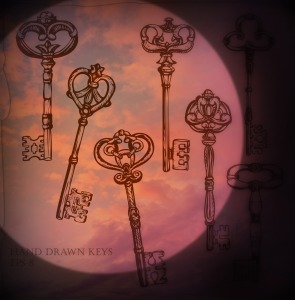 Hi, Lou Sylvre here, once again grateful to Love Bytes for the opportunity to take blog readers on a brief and hopefully not scary trip through a corner of my brain. Usually, I aim these junkets at the readers of M/M romance and other good books. This time, I’m looking at you aspiring writers out there, and issuing you a special invite for a seat on the tour boat.
Hi, Lou Sylvre here, once again grateful to Love Bytes for the opportunity to take blog readers on a brief and hopefully not scary trip through a corner of my brain. Usually, I aim these junkets at the readers of M/M romance and other good books. This time, I’m looking at you aspiring writers out there, and issuing you a special invite for a seat on the tour boat.
You see by my title I’m offering five keys and a pipe wrench that, in my opinion will help you start and finish crafting a good read.
First, I’ll define what I believe the term “a good read” means.
 Number one: A good read is a book that touches something in a reader so that they finish the book, and when they do, it has satisfied something in their minds or hearts. They might have cried, or laughed, or gotten angry in the course of it, but they end up glad they read it, and most likely would want to read more about the characters or from the author. In order for the book to meet this criteria, it will have to meet the others.
Number one: A good read is a book that touches something in a reader so that they finish the book, and when they do, it has satisfied something in their minds or hearts. They might have cried, or laughed, or gotten angry in the course of it, but they end up glad they read it, and most likely would want to read more about the characters or from the author. In order for the book to meet this criteria, it will have to meet the others.
Number two: The story makes sense. Brief anecdote—when I had children, my former mother-in-law bought me a cup that said, “Because I’m the mommy, that’s why!” Funny, and occasionally it works in parenting, at least for a minute, but if you find yourself explaining developments in your novel with the words “It’s fiction and I want it to happen anyway,” chances are you’ve made a jump that won’t work. I don’t mean it can’t happen in the story, but very likely you need to figure out what you need to do to make it happen in a way that makes sense. By the same token, the saying (immortalized in a pop song a few decades back), “It’s my party, and I’ll cry if I want to” does not translate well to “It’s my book, so I can do what I want.” This usually arises later in the process during beta reading or editing. Don’t misunderstand—you can certainly think that, even say it. But then if you want the book to be a good read, you’ll probably need to change your mind and do a little more work.
Number three: The characters make sense. No, really. Your characters can be quirky—in fact to make them seem real they should have at least some characteristics that could be called quirks. They can be likeable or loveable, but that can’t be all they are because that doesn’t make sense to anyone who has met a few humans—inconsistencies R us, right? Most stories will have a definite ‘bad guy.’ Sometimes a villain, sometimes a well-meaning or confused character who causes trouble for the ‘good guys.’ Sometimes it’s a group, or a thing, or an idea that fills the role. But even there, the ‘bad’ has to have something more—sorrow, possession, an unbreakable oath, a need to wreak havoc in order for their offspring to survive, or whatever. Again, to seem real, it cannot be flat as a two-dimensional plane, or it’s not interesting. There has to be a why, and most of the time some secondary whys for everything anybody does in your story.
Number four: The world (or universe) of your story must make sense, too. Everyone’s heard about the pitfalls of world-building, but that doesn’t just apply to speculative fiction (sci-fi, paranormal, fantasy, magical realism). It applies to every story, even if it’s written in real time, real place, real buildings. Why? Because your story never happened there. Your characters never lived there (even if they are based on people you know or real historical characters). In spec fiction, you have to be very aware of systems to make them all work together—if there’s magic, how does it work, where does it come from, what does it cost it’s user. If it’s a medieval town but they have a flying machine or flush toilets, fine, but make them have a sensible system. The farther you get away from pure sci-fi or fantasy, the fewer systems you must devise. Instead, though, just as importantly, your storyline and characters (which represent a system) must be incorporated as seamlessly as possible with the systems already in place.
I probably could go on about that, but I’m belatedly remembering that my post is supposed to be about five keys and a pipe wrench. Mind you, I propose these only as my own opinion, but I’m pretty sure that if you sincerely apply them (tweaking as necessary), they will at least help you get that book written, and make it a book you’re happy to put your name on.
 1st Key—Never, ever, ever read those books that have titles that go something like Two Million Reasons Your Book Won’t be Published, or What’s Wrong with Your Writing. Hey, be real. We’re hard enough on ourselves. These books may purport to have good advice for you, but what they really do is drive home to you, consciously, that you don’t write well enough to be published (which is more than likely wrong). Subconsciously, they’ve got you rehearsing how to do things in a way that will end with a negative result.
1st Key—Never, ever, ever read those books that have titles that go something like Two Million Reasons Your Book Won’t be Published, or What’s Wrong with Your Writing. Hey, be real. We’re hard enough on ourselves. These books may purport to have good advice for you, but what they really do is drive home to you, consciously, that you don’t write well enough to be published (which is more than likely wrong). Subconsciously, they’ve got you rehearsing how to do things in a way that will end with a negative result.
2nd Key—Think small when planning your book. Start with a narrow premise you’d like to explore, a character or two whose story you think needs writing, a single storyline or even just a start. This makes it possible for you to outline quickly and get to the writing. Believe me, the characters will multiply, as will twists, turns, and subplots. If you try to put everything in place before you begin, it will quickly become overwhelming, and you may find it harder than ever to get the job done.
3rd Key—Start the writing early in the process. Yeah, this might be called Key 2B, but I think it deserves a place of its own. The only way to begin to learn to write is to begin writing, so the longer you put it off, the longer it will take to learn. And, you’ll probably find that the longer you put off writing the story you want to turn into a book, the harder it gets to make that start. By “write” I don’t mean outline. Yes, do a broad outline, but right away pick a place to start writing—no this doesn’t have to be the beginning—any scene that calls to you. If you know how, you can kick start it by storyboarding, or just do a rough outline of the scene. You should be able to do that within an hour at the most. Then right away, put words on a blank page. It doesn’t have to be good! Just write it and don’t stop until the scene is on the page. Then do another one the next day.
4th Key—Remember you’re really not the boss, at least not all the time. Your characters will have things to say, and they will want you to write what they want to do. At least part of the time, you’re going to have to do it if you want the story to move forward—and momentum is a precious commodity in novel-writing. Likely, you will also realize that your characters have a pretty good understanding of what the story needs. Yes, they’re sometimes like berserk little children and you have to take their privileges and put them in time out (please don’t tell Luki Vasquez I said that), but they need play time, too.
5th Key—Trust your editor to be good but not perfect at their job; trust yourself to be good but not perfect at your job. This key is the only one I’m giving that’s not related to spitting out that first draft of your first novel. It’s for later, after the publisher has accepted your book, or you are at the stage in self-pubbing where you’re ready for the editor. (Yes, it will happen if you want it to and you do the work.) What I mean by “their” job and “your” job is that the editor knows how a story works, how a sentence works, and lots of stuff about grammar, spelling, punctuation, etc. That’s their domain. If they say your story doesn’t work because something’s missing, it probably is. Or if they say your main character isn’t likeable, he’s probably not. Grammar is a grayer area, because in fiction sometimes an author writes in a way that isn’t exactly proper for voice or effect—and most good editors will recognize that. It’s your job, as author, to determine whether that’s the case with each edit, no matter how small. It’s your job to know whether their suggested fix will have a different meaning than what you’ve written, because meaning is what the story is about, and that’s your domain. Take edits seriously, think about them, and respect your editor’s work and know-how. Your book will be a lot better for it when it makes it debut.
 Okay, the pipe wrench. Most people probably know that a pipe wrench comes in really handy for plumbing. But not everyone knows how much a pipe wrench can do when you use it like a hammer, either tapping or pounding as the case requires. The name of this particular pipe wrench is “just write,” and it’s the most versatile, useful item in your toolbox. Key 1 reflects this, but the pipe wrench continues to be awesome throughout the process of the novel and throughout your career. You’ll get mysterious “writer’s block.” Your muse will go on strike. You’ll get negative comments from a beta reader and think you write sucky, so why try. Etcetera! In all cases, get out the just-write pipe wrench and put words on a page. It’ll smash the self-worth bugs, it’ll put the criticism down to size. Scare the muse into suiting up and showing up. Break the clog blocking the pipes into smithereens and let it flush away.
Okay, the pipe wrench. Most people probably know that a pipe wrench comes in really handy for plumbing. But not everyone knows how much a pipe wrench can do when you use it like a hammer, either tapping or pounding as the case requires. The name of this particular pipe wrench is “just write,” and it’s the most versatile, useful item in your toolbox. Key 1 reflects this, but the pipe wrench continues to be awesome throughout the process of the novel and throughout your career. You’ll get mysterious “writer’s block.” Your muse will go on strike. You’ll get negative comments from a beta reader and think you write sucky, so why try. Etcetera! In all cases, get out the just-write pipe wrench and put words on a page. It’ll smash the self-worth bugs, it’ll put the criticism down to size. Scare the muse into suiting up and showing up. Break the clog blocking the pipes into smithereens and let it flush away.
That’s it for my advice. Really. Enough, don’t you think… Thanks for reading! Thanks for writing. Keep doing both!

I’m so glad you covered the God Ego in step Number 2. If there is anything I hate most in life it is a writer with a God Ego. “I can write….see…that’s my work…I sent it to you Mr. Harris, and you had the gall to suggest changes because in your eyes it doesn’t work…well, Mr, I’m a writer and I play God and this is MY work and I won’t change it for you or anyone else and if you don’t like it, well, stuff you, how dare you steal my work!”
Oh, I’ve heard it all.
But this just takes the cake. The writer with the God Ego needs to sit back and realize that the moment he passes his book onto a reader or an editor, the book belongs to the team. And for hump sake, Mr/Mrs God Ego, if you don’t want to make the changes, then why did you go to an editor beta reader in the first place?
I have had two or three God Ego writers on my books. The moment they say “this is my work, I will do what want with it”, well that’s the time I tell them to go and take a dump. Exactly like that, no holding back on words. No, think before you speak. These writers irk me, they are a living hell, and they probably have that attitude in life too. Believe me, if you are a writer with a God Ego, you won’t get far.
What these writers don’t get, is that word spreads. And before you know it the editor whom you approach next will dump you too.
As an editor (I’m also a writer), if you come to me, it means that you want your work to shine. I’ll do that for you, but God help you if, and when the book is finally published, and I happen to read, and I happen to note that you ignored 95% of my edits, I’ll send you a bill so quickly you won’t know how to get out of debt for the next ten years.
Thanks once again for bringing this up. Now everyone knows that I don’t like writers with the God Ego.
Good advice….thank you. And you always do it with humor.
So true, Lou, and nicely put.